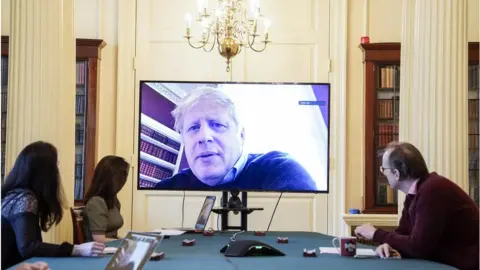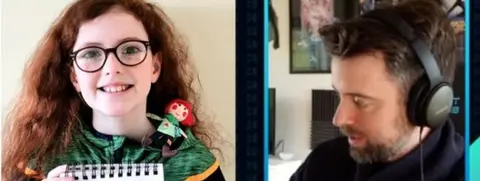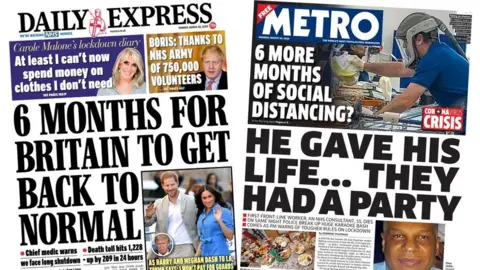Coronavirus briefing: UK 'six months from normal' and US extends restrictions
If you want to get this briefing by email, sign up here
PM praises UK response
 Downing Street
Downing StreetThe prime minister may be in isolation with coronavirus, but he tried to rally the country on Sunday night in his latest message to the nation. It came after two days in which the UK death toll jumped significantly to 1,228, including two NHS doctors.
Citing the 20,000 former NHS staff who have returned to work and the 750,000 members of the public who have volunteered to help the most vulnerable, a croaky-sounding Boris Johnson said it was proof his Conservative predecessor Margaret Thatcher was wrong when she famously declared "there is no such thing as society". The PM also said the majority of people appeared to be obeying social distancing restrictions imposed to slow the spread of the virus, despite some eye-catching exceptions.
Earlier, England's deputy chief medical officer Dr Jenny Harries warned it could be six months before life in the UK returned to normal - although she stressed that didn't mean "complete lockdown" for all that time. Instead, restrictions will most likely be eased gradually over the next three to six months. Lifting restrictions too early could be dangerous, she added.
We're all becoming very familiar with the need to keep at least two metres away from other people - health correspondent Laura Foster helps explain the best ways to do that. You can also meet some of the "shielded" - those enduring 12 weeks of total isolation - and watch the impact of the "stay at home" message on London's usually clogged streets in this striking timelapse video.
Global picture
Donald Trump had said he believed the US could get back to something approaching normal by Easter, but on Sunday night, the president appeared to abandon that hope. He said social distancing measures would be extended across the US until at least 30 April. The death toll in the US has reached almost 2,500, and earlier, White House medical adviser Dr Anthony Fauci warned the virus could eventually kill up to 200,000 Americans.
Elsewhere in the world, Australia has tightened restrictions on public life designed to tackle the disease, while India's prime minister has apologised for the impact of similar curbs. Narendra Modi has been criticised over the lack of planning ahead of India's shutdown, which has left many citizens jobless and hungry.
Globally, there have been more than 720,000 infections and almost 34,000 deaths. Italy remains by far the worst hit country, with more than 10,000 fatalities, followed by Spain and then China. Our visual guide shows how coronavirus has spread around the world - or if you're in the UK, find out the picture at a local level here.


Readying the NHS
We know a surge in coronavirus cases is coming and that means a huge increase in pressure on the NHS. Our health correspondent Nick Triggle looks at what it has been doing to prepare. One step has been to create a big field hospital in east London and we've learned that thousands of cabin crew left without work due to the crisis have been offered jobs there.
Supply of equipment will also be crucial as things intensify, and in a piece of good news this morning, a breathing aid which can help keep coronavirus patients out of intensive care has been created in under a week. Up to 1,000 of the CPAP machines can be produced per day, and creators say they will save lives by ensuring ventilators are kept available for only the most seriously ill. Why are ventilators so vital? Here we explain.
Why are people stealing hospital supplies?
By Dr John Wright, Bradford Royal Infirmary
Following the UK-wide lockdown the hospital followed suit, in a bid to limit transmission of the coronavirus. Eighteen entrances across the 26-acre site were sealed off and everyone is now funnelled through one main door. But on Thursday night, as millions of people across the UK stepped out of their houses and applauded NHS workers, one man carefully dressed in doctor's scrubs. He even completed his disguise with a stethoscope. He then attempted to bluff his way past the security guard demanding to see his pass, and when he was exposed he made a run for it.
One thing not to miss today

Listen up
On the latest Coronavirus Newscast, the team talk to special guest Nigella Lawson about your isolation dinner dilemmas. And in From Our Own Correspondent, BBC colleagues from Singapore, Germany and elsewhere report on the fight against the disease where they are.
What the papers say

Most papers highlight the warning that life in Britain will not return to normal for six months. The Times says it's "almost inevitable" the current restrictions will be extended beyond the three weeks initially announced. The Daily Telegraph feels the rising death toll "will convince the country that more time is needed", but people "need to be told something more than things are going to get worse if we are to get through this". A number of papers feature an image of Amged El-Hawrani - one of the first British doctors to die with the virus. According to the Guardian, his death - and that of another doctor, Adil El Tayar - has "intensified pressure" on ministers to accelerate the supply of protective equipment to staff. The Daily Mirror says doctors are "pleading", and the Daily Mail thinks Housing Secretary Robert Jenrick "faced a rough ride" over No 10's handling of the pandemic on Sunday.
From elsewhere


Need something different?
Who is really in control of your mind? BBC Ideas explains why the answer isn't quite as straightforward as you probably think. As the final episode of the BBC's gripping podcast Girl Taken is released, we speak to ex-soldier-turned-good-Samaritan Rob Lawrie who was drawn into a web of lies and life-changing events. Finally, read about why the BBC's Justin Rowlatt found a trip to Antarctica made him emotional, and ultimately hopeful. The piece also includes some truly stunning photographs of a barely-visited land.
